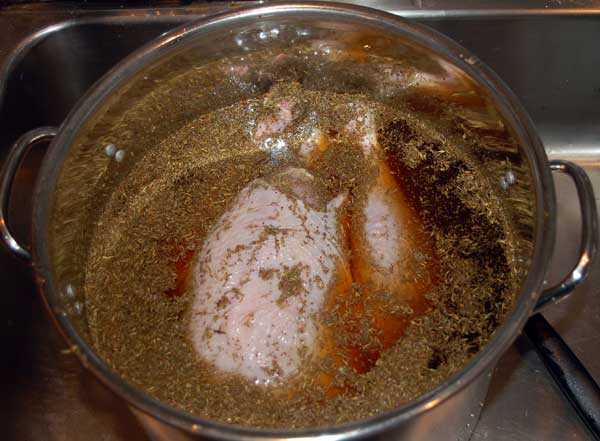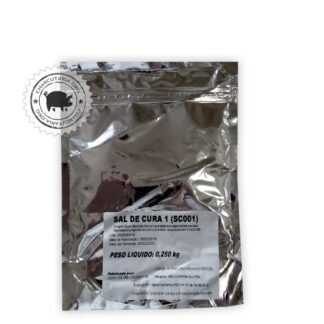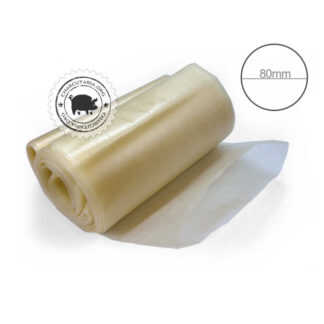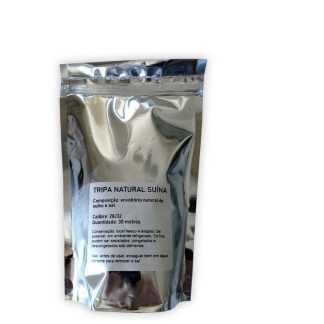
A salmoura é a mistura de sal de cozinha e água e é uma ferramenta frequentemente utilizada na culinária pois é muito prática e eficaz, transformando uma carne seca e sem sabor em deliciosa e suculenta. Seu efeito é bem rápido, eficiente e por esse motivo mesmo é muito fácil mergulhar seu alimento por muito tempo ou em quantidades excessivas de sal. Portanto, tome muito cuidado e use com precisão, caso contrário o produto poderá ficar muito salgado. O resultado final dependerá de três fatores, o primeiro é o quanto de sal há na salmoura, o segundo é o tamanho da peça de carne(carne é a nossa referência), o terceiro é o tempo de imersão da carne na salmoura.
É possível salvar a carne caso fique muito salgada, basta mergulhá-la em água pura para que o processo inverso ocorra, ou seja, as concentrações tenderão ao equilíbrio e ocorrerá uma migração para a água com concentração de sal mais baixa. Mas isso levará tempo e, caso tenha incluído temperos na salmoura, irá equilibrá-los também.
Para entender como funciona a salmoura, leia o texto sobre como funciona a salmoura.
Em peças pequenas é fácil testar o ponto, basta retirar a carne, lavar, secar bem, cortar um pedacinho, cozinhar e experimentar, caso esteja um pouco mais salgado do que o ponto desejado, ótimo, está pronto, pois o sal continuará migrando para o interior da carne enquanto descansa na geladeira. Mas, em peças maiores é complicado testar, pois é muito difícil experimentar a quantidade de sal do interior da peça.
Receita de salmoura básica
A regra geral básica é utilizar 50 gramas de sal para 1 litro de água. Adicionalmente é recomendável acrescentar 30 gramas de açúcar, pois irá auxiliar no equilíbrio do sabor e na coloração proveniente da caramelização da carne, principalmente quando grelhada ou assada. Além disso é possível acrescentar temperos para incorporar sabores e aromas.
Preparo da salmoura
Junte todos os ingredientes, cozinhe por algum tempo para que todos o sal e o açúcar sejam dissolvidos por completo e os temperos soltem sabor. Lembre-se que a evaporação irá reduzir a quantidade de água, então não cozinhe por muito tempo. Retire do fogo, deixe esfriar à temperatura ambiente e refrigere.
Tempos de cura na salmoura
| Tipo | Peso/Tamanho | Tempo |
|---|---|---|
| Peito de frango desossado | 200 gramas | 2 horas |
| Frango inteiro | 1 quilo | 4 a 6 horas |
| Peru inteiro | 4 a 7 quilo | 24 horas |
| Costeletas de porco | 3 cm de espessura | 2 horas |
| Lombo de porco | 2 quilos | 12 horas |
| Filé de peixe | Espessura fina | 1 hora |
| Posta de peixe | 2.5 cm de espessura | 1 hora |
Dicas de salmoura
- Sempre descarte a salmoura após o primeiro uso. Ela estará carregada de líquidos e impurezas que saíram da carne;
- Deixe a carne descansar na geladeira após retirar o produto da salmoura. O sal terminará de migrar e ficará equilibrado entre e superfície e o interior da carne;
- Sempre refrigere a salmoura antes de mergulhar a carne. Isso afeta os tempos de cura, mantenha sempre um padrão;
- Mantenha no refrigerador durante o tempo de cura;
São apenas sugestões de salmoura e tempos, mas é importante testar e adaptar as receitas para as preferências e particularidades individuais e regionais.




Ola tudo bem estou começando a trabalhar com frango assado poderia me ajudar gostaria saber qual a quantidade de sal que eu uso para um frango de 2 quilos
Olá amigo, obrigado pelo excelente material. Sempre fiquei com uma pulga atrás da orelha com relação às proporções de sal/agua/carne em imersão. Isto é, se tenho dois casos onde em um eu coloco 1 litro de água e 500g de carne e noutro também 1 litro mas com 250 gramas de carne a quantidade de sal deve permanecer a mesma? Se não, como eu devo ponderar esses três elementos?
Um abraço
Oi Thiago. Para as salmouras com alta concentração de sal, vai variar o tempo de imersão pela espessura das peças, carnes mais finas ficam menos tempo, carnes mais espessas ficam mais tempo. A quantidade de sal permanece a mesma pois já é bem alta. A pressão osmótica e difusão atuaram da mesma forma com 500g ou 250g de carne. Na dúvida sempre recomendo usar a salmoura por equilíbrio, em que a quantidade de sal é regulada conforme a soma do peso da carne e da água, é mais fácil de controlar e sempre terá um resultado preciso. Veja aqui: Salmoura por equilíbrio
Olá. Interessante artigo.
No caso do lombo, após as 12h quanto tempo e onde deve ficar a descansar?
Não é necessário descansar após o tempo de imersão.
Em relacao ao tempo de imersão, ja vi em varias receitas para ficar 7 dias!!!
Depende da espessura da carne. Um filé de peixe vai necessitar de muito menos tempo do que, por exemplo, um lombo de porco. Uma quantidade fixa de dias não abrange essas necessidades diferentes de cada tipo e espessura de carne.
tubo bem, mas se for um lombo, com 1,5 a 2kg, com 4/5 dedos da altura é o que tenho visto:
receitasemenus net/lombo-de-porco-em-salmoura/
Outra coisa que precisa atentar é para a concentração de sal da salmoura. No caso deste post, a salmoura tem 5% de sal, ou seja, é de concentração salina mais alta, isso reduz o tempo necessário de imersão da carne. Se for uma salmoura com baixo teor de sal, o tempo vai ser bem mais longo. Não há uma regra única, é preciso avaliar a salmoura e a espessura da carne. Se está seguindo uma receita específica, faça conforme ela sugere. No caso da salmoura deste post, o tempo de imersão desta carne que citou seria menor pela concentração de sal mais alta. Se está em dúvidas, sugiro que faça a salmoura por equilíbrio, que é bem mais precisa, não tem como errar: https://charcutaria.org/sal/salmoura-por-equilibrio/
Bom dia .parabéns pelo site ,incrível.
Vou fazer um leitão de 13 kilos, a pergunta é faço ba salmoura ou injetado?
Sendo que disseram que na salmoura a pele não ficará crocante e sim borrachudo.
Se injetado qto tempo se deixa pra pegar o tempero ou injetado já pode ir direto no tambor ?
Obrigado.
Mesmo injetando é recomendado deixar pelo menos 12 horas refrigerado.
Boa noite,
Para injetar o tempero com seringa, qual a proporção de água, sal e outros condimentos?? Qual tempo de descanso na geladeira para frango injetado?
Jefferson, tem que aplicar conforme o volume de líquido que vai injetar. Se vai injetar 200ml em um frango, nesses 200ml tem que ter, por exemplo, 1,8% de sal e o restante dos temperos e aditivos, sempre na proporção.
Bom dia. Parabéns pelo site. Gostaria de saber se ao usar vinho na salmoura essa quantidade é somada com a água para calcular o sal? Por exemplo: 1 litro de vinho + 2 litros de água = 150 g de sal. Está correta a proporção?
Sim, é preciso somar o volume do vinho no cálculo do sal. Está corretoo seu cálculo. 1L vinho + 2L água = 3(L) x 50(G) = 150G de sal.
No caso do bacon devesse deixar a salmoura na carne durante quanto tempo
Depende da espessura da peça, mas, de forma geral, 24 horas serão suficientes. Se o pedaço da barriga for espesso, deixe 48 horas.
Vou assar um peixe de 15 kgs qual a recomendação de salmoura?
Tem algum problema deixar o file de frango na salmoura por um, dois ou até três dias?
Caso seja uma salmoura por equilíbrio, não há problema. Caso seja uma salmoura com bastante sal, então sim pois os filés ficarão muito salgados.
Boa tarde, gostaria de salmourar joelho de porco. O osso requer algum tipo especial de cuidado?? Obrigada.
Oi Cintia, não precisa de nenhum tratamento diferenciado para o osso, pode deixar junto na salmoura.
Bom dia, quantos dias preciso deixar o peito bovino (maçã de peito) na salmora
Na salmoura básico creio que 12 horas seja suficiente.
Quero uma receita pra fazer asinhas de frango
Olá, podem por gentileza indicar um receita de salmoura+condimentos para cupim de boi?
Boa tarde! E seguro consumir um frango resfriado q deixei marinando no soro do kefir por 5 dias?
Oi Carmen, não sei dizer pois nunca lí sobre o efeito do kefir nas carnes.
Deixei um frango resfriado no soro do kefir por 5 dias.posso consumir ou e arriscado?
Boa tarde! Como fazer uma salmoura para costela bovina? Obrigado!
Farei uma costela suína de 5 a 6 kg assada no fogo. qual a indicação.Salmoura ou marinada? Alguma receita?
Parabéns pelo site.
Desde já grato.
Oi Carlos, faça um tempero seco mesmo. A base pode ser 14g de sal por kg de costela. Os demais temperos podem ser a gosto, o mais importante é acertar bem o sal.
Vou fazer uma costela no tambor de 11 KG, qual o procedimento para temperar na salmoura? E por quanto tempo ela deve curtir?
Um peça desse tamanho vai ser difícil deixar imersa na salmoura. O mais fácil é aplicar uma condimentação seca mesmo, use 2% de sal sobre o peso da carne e os condimentos que quiser, esfregue bem por toda a carne. Depois Refrigere por 2 dias antes de assar no tambor.
Prezado, pode fazer salmoura para vários produtos ao mesmo tempo. Fazer salmoura para 30 frangos de uma vez? Ou é melhor marinada?
Pode fazer sim, mas para essa quantidade é mais comum injetar a salmoura. Por imersão precisaria de um espaço muito grande.
Agradeço pela resposta, isso irá me ajudar muito no meu negócio.
QUAL A CONCENTRAÇÃO MÁXIMA RECOMENDADA DE SAL DE CURA (PÓ HÚNGARO III) OU OUTROS EM SALMORAS PARA IMERSÃO DE PERNIL, VISANDO A PREPARAÇÃO DO TRADICIONAL PRESUNTO NATALINO?
PODERIAM NOS SUGERIR UMA COMPOSIÇÃO COMPLETA DE SALMORA PARA CADA QUILO DE PERNIL IN NATURA?
Olá, José Olympio. A concentração máxima vai depender da quantidade de aditivo que o seu pó húngaro(sal de cura) tem de nitrito e/ou nitrato. No Brasil não há padronização então cada fabricante faz com porcentagens diferentes do aditivo. O limite no Brasil é determinado pelo Ministério da Agricultura e está em 150ppm de nitrito residual no produto final. Para o sal de cura(pó húngaro) com 6,25% de nitrito(padrão instacure#1), a quantidade mínima a ser adicionada é de 2,4g por kg de carne. Para saber o máximo é preciso conhecer a taxa de conversão. Com o tempo o nitrito é convertido e apenas aquilo que não foi convertido fica como nitrito residual no produto final, e esse residual é o que é regulamentado. Acredito que, para esse padrão de sal de cura(instacure#1), o ideal seja acrescentar até, no máximo, 4g por kg de carne. Os posts abaixo podem te ajudar nesta decisão.
Ademais sugiro 2% de sal comum e 1% de açúcar sobre o peso da carne + líquidos da salmoura. Os demais condimentos são à gosto.
Sal de cura o que é e quanto usar
Tempo de conversão do nitrito nas carnes curadas
Pode tirar o frango da salmoura deixando refrigerado para assar depois?
Pode sim, sem problemas.
Sensacional este site! Parabéns e obrigada pelas dicas. Gostaria de saber se posso acrescentar vinho e ervas à salmoura ou se preciso primeiro botar a carne na salmoura e só depois botá-la numa marinada com vinho, alho e ervas. Obrigada!
Oi Rosa. Pode colocar o vinho e as ervas na salmoura sim. Pode inclusive ferver por alguns minutos as ervas em um pouco de água, extraindo os óleos essenciais e aromas para posteriormente acrescentar à salmoura. Abraços!
Fiz o Lombo Suíno e todo mundo gostou. Obrigado pela dica. Estou querendo fazer coxa e sobrecoxa de frango assada, o tempo na salmoura seria o mesmo? Alguma dica a mais?
Existe a necessidade de adicionar o açúcar na elaboração da salmoura?
Vejo algumas receitas de salames e linguiças também com a adição de açúcar.
Há muita diferença em não colocar açúcar?
Minha intenção é ter um produto de qualidade para uso particular.
Obrigado pela atenção
Oi João, na salmoura a função é apenas para dar sabor e mascarar um pouco a acidez de algum ingrediente, como limão, vinagre ou vinho. No salame e copa pode ter a função de fonte de alimento para a cultura starter. Nas linguiças serve para dar sabor e ajudar na coloração final pela caramelização. Pelo que sei são essas as funções do açúcar, mas pode ter mais coisa que desconheço. Abraços.
Olá, essa receita acima de 1 litro de agua, 50 gr de sal, 30 gr de açucar é para qual quantidade de carne?
Obrigado
Oi Cássio, de acordo com o peso e a espessura da carne o tempo de imersão deve ser alterado, conforme tabela de referência abaixo copiada do texto.
– Peito de frango desossado – 200 gramas – 2 horas
– Frango inteiro- 1 quilo – 4 a 6 horas
– Peru inteiro – 4 a 7 quilos – 24 horas
– Costeletas de porco – 3 cm de espessura – 2 horas
– Lombo de porco – 2 quilos – 12 horas
– Filé de peixe – Espessura fina – 1 hora
– Posta de peixe – 2.5 cm de espessura – 1 hora
Portanto, o peso e a espessura do produto podem variar e, de acordo com isso, deve alterar o tempo que o produto ficará imerso. Caso queira uma salmoura mais precisa, recomendo que leia o post sobre a Salmoura por equilíbrio
Cara, que informação, aprendi coisas até então imagináveis, achei que sabia alguma coisa, mas baaa, nem nunca imaginava, que aula, parabéns valeu!
Olá ,
No caso se eu usar sal de cura eu adiciono ele na salmoura , diretamente na carne antes da salmoura ou adiciono diretamente na carne depois do processo de salmoura momentos antes de ir para o defumador ? Obrigado.
Felipe, adicione na salmoura.
ola eduardo, quanto tempo a carne deve descansar na geladeira depois da salmoura?
Desconheço prazo de descanso posterior à salmoura, creio que a carne possa ser usada imediatamente após a imersão. Talvez para salmouras rápidas, com concentração elevada de sal, seja necessário um período de equilíbrio posterior à imersão, mas não sei te informar com precisão. Caso alguém tenha alguma informação complementar, por favor, compartilhe!
Não vi nenhuma dica para carneiro. Para um pernil de 1,5 kg, qual a quantidade de sal e tempo de imersão necessários?
Boa noite, estou com uma dúvida, será que poderia me ajudar?
Pretendo fazer um lombo de porco recheado para o natal, não é grande, tem aproximadamente 1,5 kg e está aberto em manta, seria recomendável deixá-lo na salmoura antes de rechear e assar?
Priscila, sim, a salmoura é uma ótima opção. Caso não haja tempo para a salmoura pode simplesmente marinar com 1,5% de sal do peso total da carne, acrescentar os demais temperos que quiser e deixar de um dia pro outro na geladeira. Assim o sal ficará no ponto certo.